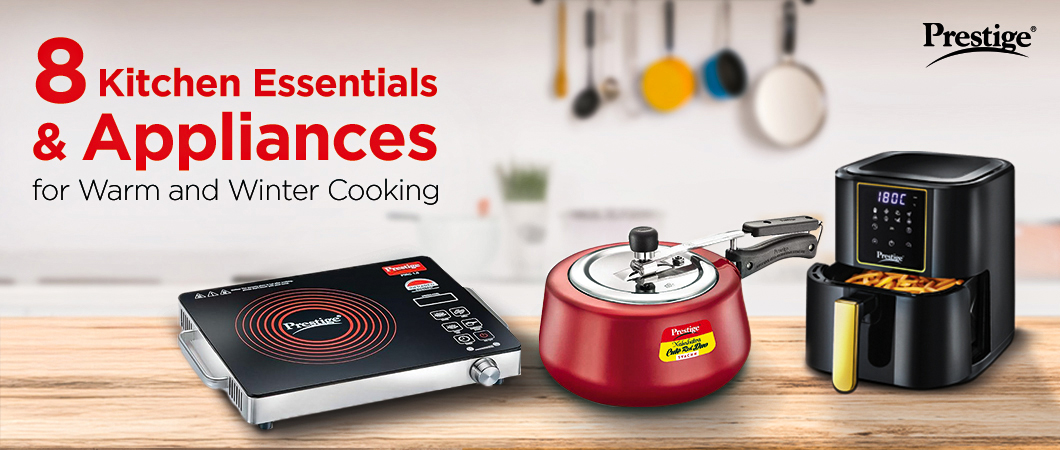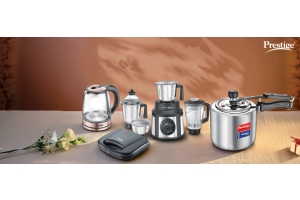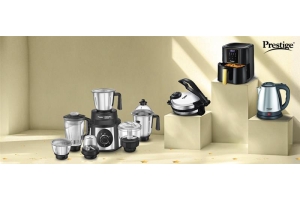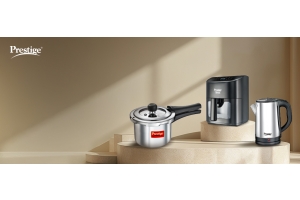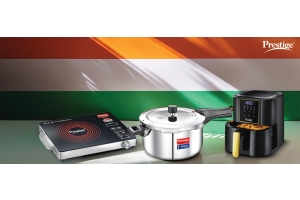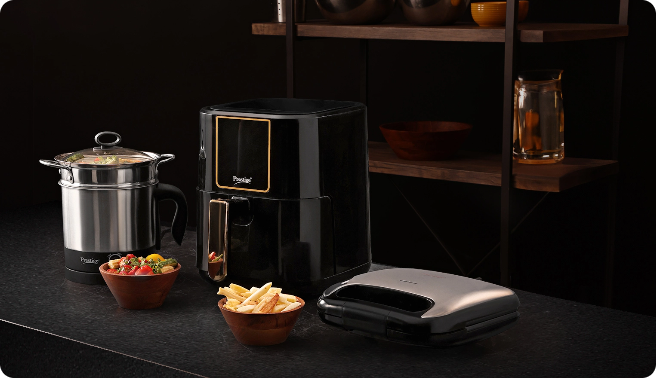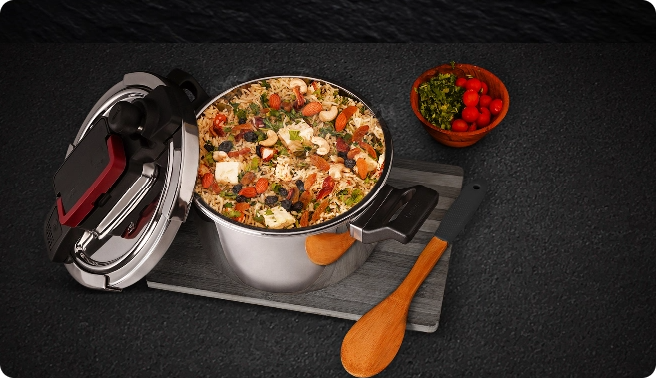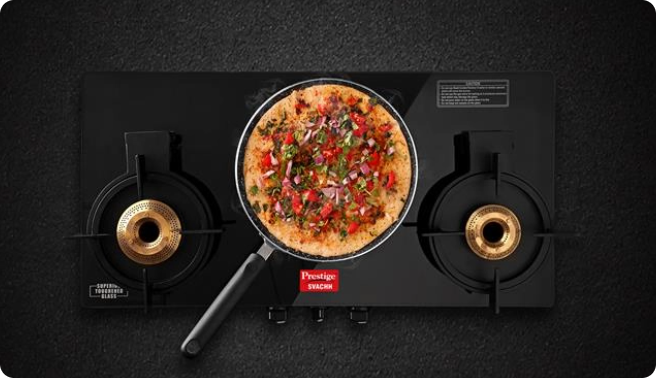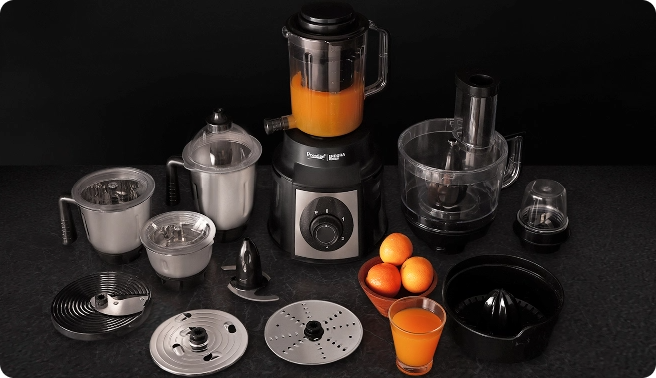Introduction
As winter settles in, the desire for hearty, comforting meals grows. Equipping your kitchen with the right tools can make preparing these dishes both efficient and enjoyable. In this blog, we'll explore essential kitchen appliances that are perfect for winter cooking, ensuring you can create warm, nutritious meals throughout the season.
What Kitchen Essentials Do You Need in Winter?
Winter cooking in India often revolves around preparing hearty meals that are full of spices, flavours, and rich textures. To make this process easier, several kitchen essentials are a must-have. A pressure cooker is indispensable in an Indian kitchen, especially during winter, for making quick and delicious dals, soups, and stews, which are staples in cold weather. For those who enjoy baking or making traditional Indian sweets like gajar ka halwa or tilgul, a stand mixer becomes essential, helping in the preparation of doughs and batter with ease. Additionally, an electric griddle is perfect for making toasted sandwiches, parathas, and dosas, offering convenience and consistency.
To make traditional dishes like khichdi, pulao, or biryani, an electric rice cooker ensures perfectly cooked rice every time. An immersion blender is a great tool for blending soups and purees directly in the pot, making meal prep quicker and easier. To brew masala chai or enjoy hot beverages like soup or coffee, an electric kettle becomes a lifesaver during the cold mornings and evenings. These kitchen essentials not only make your cooking more efficient but also ensure that you can enjoy the warmth and comfort of traditional Indian winter recipes with ease.
Why Healthy Eating is Essential in Cold Winter
During winter, our bodies face increased demands to stay warm and energized. As the temperatures drop, it becomes even more important to fuel the body with nutritious foods that support overall well-being. Healthy eating in winter not only helps in maintaining an optimal body temperature but also strengthens the immune system, which is more susceptible to infections during the cold months. A well-balanced diet rich in vitamins, minerals, and healthy fats helps the body fight off illnesses, including the common cold and flu, which tend to circulate more in winter. Proper nutrition also ensures that energy levels stay high, allowing you to remain active and resilient despite the cold weather. Nutritious winter meals, especially those that are hearty and warming, play a key role in providing the necessary fuel and promoting overall health throughout the season.
Top Benefits of Eating Nutritious Meals During Winter
-
Boosts Immunity: Winter brings with it a higher risk of illnesses like the flu and cold. A diet rich in vitamins such as Vitamin C, Vitamin D, and minerals like zinc, along with immune-boosting ingredients such as garlic, ginger, and turmeric, can help strengthen the immune system. These nutrients help the body ward off common winter illnesses by enhancing immune function and reducing inflammation. Including foods like citrus fruits, leafy greens, and nuts in your diet can also contribute to better immune health. (Source: British Heart Foundation)
-
Enhances Mood: As the days grow shorter and sunlight becomes scarce, many people experience a dip in mood and energy, commonly referred to as the "winter blues." Eating nutrient-dense foods rich in omega-3 fatty acids (found in fish, nuts, and seeds), antioxidants (found in berries, spinach, and other colourful vegetables), and vitamins like B12 can help improve mood and alleviate feelings of depression. These nutrients contribute to the production of serotonin, a mood-boosting neurotransmitter that regulates mood and mental health.
-
Regulates Body Temperature: The body requires more energy during winter to maintain a stable internal temperature. Consuming warm, hearty meals like soups, stews, and curries not only provides comfort but also helps regulate body temperature. Ingredients like hot spices (such as cumin, chilli, and ginger) stimulate circulation and can increase warmth from the inside out. Additionally, meals that include healthy fats, like those from nuts, avocados, or coconut, provide the body with long-lasting energy and warmth throughout the day.
-
Supports Digestion: In winter, the digestive system tends to slow down due to the cold weather. Eating nutrient-rich, fibre-packed foods such as whole grains, lentils, beans, and vegetables can help improve digestion and prevent issues like constipation, which can be common during the colder months. These foods also promote gut health, which is vital for overall immunity and well-being.
-
Promotes Better Sleep: A balanced diet that includes warm, wholesome meals rich in magnesium and tryptophan (found in turkey, seeds, and bananas) can help promote restful sleep. This is especially important during winter when many people experience changes in their sleep patterns due to reduced daylight. Proper nutrition helps the body relax and prepare for sleep, ensuring you wake up feeling refreshed and energised.
Best Winter Recipes to Warm Up Cold Nights
Winter is the perfect time to indulge in hearty and comforting vegetarian dishes that not only warm you up but also provide necessary nutrients to fight off the cold. Here are some popular Indian winter recipes that will make your cold nights cosy and enjoyable:
-
Gajar Ka Halwa (Carrot Pudding): This warm, sweet dessert is a staple during the winter months in India. Made from freshly grated carrots, milk, sugar, and ghee, it’s a flavourful treat that brings warmth and sweetness to the season. Garnished with cardamom, cashews, and almonds, Gajar Ka Halwa is rich in vitamins and perfect for a cosy night in.
-
Methi Thepla: A popular Gujarati flatbread made from fenugreek leaves (methi), wheat flour, and a blend of spices like cumin, coriander, and turmeric. This warming bread can be served with yoghurt or pickles for a filling and nutritious meal. Fenugreek leaves are known for their health benefits, especially during the winter months when they help in keeping the body warm.
-
Vegetable Stew (Kerala-style): A comforting dish made with a variety of seasonal vegetables like carrots, potatoes, beans, and peas, all simmered in a fragrant coconut milk broth with mild spices. It’s a wholesome meal that can be paired with soft appams or rice, providing warmth and nourishment.
-
Palak (Spinach) Soup: Spinach is a great source of iron and vitamins, making it ideal for winter. Palak soup, cooked with a hint of garlic, ginger, and cumin, is both nutritious and comforting. It is perfect for a light yet warming meal during chilly nights.
-
Aloo Gajar Methi Ki Sabzi: A simple and delicious dry vegetable curry made from potatoes, carrots, and fenugreek leaves. The combination of these ingredients makes it the perfect winter dish. The addition of ginger and cumin provides warmth, while the vegetables offer a satisfying meal that keeps you full for hours.
-
Masala Khichdi: This is the ultimate comfort food in winter. Made from rice and lentils, khichdi is spiced with cumin, ginger, and turmeric and cooked to a soft, porridge-like consistency. It’s nourishing, easy to digest, and ideal for cold winter nights when you want something light yet filling.
-
Gajar Methi Paratha: This hearty flatbread is made with whole wheat flour, grated carrots, and fenugreek leaves. The dough is spiced with cumin, ajwain, and red chilli powder and then rolled out into soft, delicious parathas. It pairs well with yoghurt or pickles and is a great option for breakfast or dinner during the winter months.
-
Lauki (Bottle Gourd) and Toor Dal Soup: This easy-to-make soup is both light and wholesome, ideal for winter. Bottle gourd is high in water content and helps in digestion, while toor dal provides protein. Spiced with turmeric, ginger, and garlic, this soup is a warming and nutritious option for the season.
8 Must-Have Kitchen Essentials & Appliances for Cosy Winter Cooking
Winter cooking requires a set of kitchen tools and appliances that can handle the demands of slow cooking, steaming, and simmering hearty dishes. Here are the 8 must-have kitchen essentials and appliances that will make your winter cooking more efficient and enjoyable:
-
Pressure Cooker: Essential for Indian cooking, the pressure cooker helps you prepare lentils, dals, stews, and soups quickly, making it perfect for busy winter evenings. It locks in flavours while retaining the nutrients of the ingredients.
-
Mixer Grinder: Whether it’s grinding spices, making pastes, or blending soups, a powerful mixer grinder is an absolute must for any kitchen. It helps in creating smooth textures for curries and soups, making meal prep easier.
-
Induction Cooktop: Ideal for fast and efficient cooking, an induction cooktop ensures uniform heat distribution, making it perfect for cooking dishes like khichdi or for deep frying snacks like samosas on a cold winter day.
-
Electric Kettle: Perfect for brewing hot beverages like masala chai or soups, an electric kettle is a convenient appliance that quickly heats water without the need for a stove. It's ideal for preparing drinks to warm up on cold evenings.
-
Hand Blender (Immersion Blender): For soups like Palak Soup or creamy dal, an immersion blender helps blend the ingredients directly in the pot, making the process quicker and mess-free.
-
Roti Maker/Paratha Maker: Making fresh, soft rotis or parathas is essential for Indian meals, and a paratha or roti maker ensures that your bread is evenly cooked, saving you time in the kitchen.
-
Air Fryer: While traditionally associated with frying, an air fryer can also be used to roast vegetables, making it a versatile appliance. It helps in making healthier versions of fried foods like pakoras or roasted sweet potatoes during the winter months.
5 Best Tips for Choosing the Right Winter Kitchen Essentials
-
Look for Versatility: Choose kitchen essentials that can handle a variety of cooking tasks. Appliances like a pressure cooker or a mixer grinder can be used for multiple recipes, making them a valuable addition to your kitchen.
-
Check for Energy Efficiency: Winter cooking can increase energy consumption, so it’s important to invest in energy-efficient appliances. Opt for induction cooktops, slow cookers, and air fryers that reduce cooking time while consuming less power.
-
Prioritise Durability: Winter cooking often involves heavy-duty cooking tasks like slow simmering and braising. Make sure to choose appliances made from durable materials like stainless steel or cast iron, which can withstand prolonged use.
-
Consider Size and Storage: Kitchen space can be limited, especially during the winter when you might be cooking more often. Choose appliances that are compact and easy to store without sacrificing functionality.
-
Read Reviews and Ratings: Before investing in any winter-specific appliances, read reviews and ratings from users who have similar cooking habits. This will give you insights into the performance and reliability of the appliance.
Conclusion
Winter cooking is all about creating comforting, nutritious meals that warm the body and soul. With the right kitchen essentials and appliances, cooking hearty vegetarian dishes like Gajar Ka Halwa, Masala Khichdi, and Vegetable Stew becomes a breeze. The key to enjoying winter cooking is investing in the right tools that can make the process more efficient while also ensuring your meals are delicious, healthy, and warming. From pressure cookers to slow cookers and induction cooktops, these must-have kitchen essentials will make your winter cooking experience enjoyable and stress-free.
Frequently Asked Questions (FAQs)
1. What is the best appliance for making winter soups?
A. A pressure cooker or an immersion blender is ideal for making smooth and creamy soups during winter. They allow you to simmer ingredients slowly, bringing out rich flavours.
2. Can I use an air fryer to make winter snacks like pakoras?
A. Yes, an air fryer is a great alternative for making crispy winter snacks like pakoras, fritters, or even roasted vegetables in a healthier, oil-free way.
3. Which kitchen appliance helps cook winter stews quickly?
A. A pressure cooker is perfect for making winter stews and dals quickly, without compromising on taste or texture.
4. Is it worth investing in a mixer grinder for winter cooking?
A. Absolutely! A mixer grinder is essential for grinding spices, making pastes, and blending soups, making it an indispensable appliance for winter cooking.
5. How can I make my winter cooking more energy-efficient?
A. Opt for energy-efficient appliances like induction cooktops, slow cookers, and air fryers that consume less energy while cooking meals quickly and efficiently.

